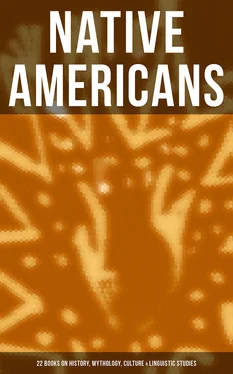Their country was especially adapted to stock raising and their flocks and herds increased in proportion to the zeal and industry of their owners. The proceeds of their surplus cotton placed within reach most of the comforts and many of the luxuries of life. The unselfish devotion of the missionary societies had furnished them with religious and school instruction, of which they had in large numbers eagerly availed themselves. 691From the crude tribal government of the eighteenth century they had gradually progressed until in the month of July, 1827, a convention of duly elected delegates from the eight several districts into which their country was divided 692assembled at New Echota, and announced that "We, the representatives of the people of the Cherokee Nation, in convention assembled, in order to establish justice, insure tranquillity, promote our common welfare, and secure to ourselves and our posterity the blessings of liberty, acknowledging with humility and gratitude the goodness of the sovereign Ruler of the Universe in offering us an opportunity so favorable to the design and imploring His aid and direction in its accomplishment, do ordain and establish this constitution for the government of the Cherokee Nation." By the constitution thus adopted the power of the nation was divided into legislative, executive, and judicial departments. The legislative power was vested in a committee and a council, each to have a negative on the other, and together to be called the "General Council of the Cherokee Nation." This committee consisted of two and the council of three members from each district, and were to be elected biennially by the suffrages of all free male citizens (excepting negroes and descendants of white and Indian men by negro women who may have been set free) who had attained the age of eighteen years. Their sessions were annual, beginning on the second Monday in October. Persons of negro or mulatto blood were declared ineligible to official honors or emoluments.
The executive power of the nation was confided to a principal chief, elected by the general council for a term of four years, and none but native born citizens were eligible to the office. The chief was required to visit each district of the nation at least once in two years, to keep himself familiarized with the condition and necessities of the country. His approval was also required to all laws, and, as in the case of our own Government, the exercise of the veto power could be overcome only by a two-thirds majority in both houses of the national legislature. An executive council of three members besides the assistant principal chief was also to be elected by the joint vote of the two houses for the period of one year.
The judicial functions were vested in a supreme court of three judges and such circuit and inferior courts as the general council should from time to time prescribe, such judges to be elected by joint vote of the general council.
Ministers of the gospel who by their profession were dedicated to the service of God and the care of souls, and who ought not therefore to be diverted from the great duty of their function, were, while engaged in such work, declared ineligible to the office of principal chief or to a seat in either house of the general council. Any person denying the existence of a God or a future state of rewards and punishments was declared ineligible to hold any office in the civil department of the nation, and it was also set forth that (religion, morality, and knowledge being necessary to good government, the preservation of liberty, and the happiness of mankind) schools and the means of education should forever be encouraged in the nation.
Under this constitution elections were regularly held and the functions of government administered until the year 1830, when the hostile legislation of Georgia practically paralyzed and suspended its further operation. Although forbidden to hold any more elections, the Cherokees maintained a semblance of their republican form of government by tacitly permitting their last elected officers to hold over and recognizing the authority and validity of their official actions. This embarrassing condition of affairs continued until their removal west of the Mississippi River, when, on the 6th of September, 1839, they, in conjunction with the "Old Settlers," adopted a new constitution, which in substance was a duplicate of its predecessor.
This removal turned the Cherokees back in the calendar of progress and civilization at least a quarter of a century. The hardships and exposures of the journey, coupled with the fevers and malaria of a radically different climate, cost the lives of perhaps 10 per cent of their total population. The animosities and turbulence born of the treaty of 1835 not only occasioned the loss of many lives, but rendered property insecure, and in consequence diminished the zeal and industry of the entire community in its accumulation. A brief period of comparative quiet, however, was again characterized by an advance toward a higher civilization. Five years after their removal we find from the report of their agent that they are again on the increase in population; that their houses, farms, and fixtures have greatly improved in the comforts of life; that in general they are living in double cabins and evincing an increasing disposition to provide for the future; that they have in operation eleven common schools, superintended by a native Cherokee, in which are taught reading, writing, arithmetic, bookkeeping, grammar, geography, and history, which are entirely supported at the expense of their own national funds, and which are attended by upwards of five hundred scholars; that the churches are largely attended and liberally supported, the Methodists having 1,400 communicants, the Baptists 750, and other denominations a smaller number; that a national temperance society boasts of 1,752 members; that they maintain a printing press, from which publications are issued in both the English and Cherokee tongues; that some of them manifest a decided taste for general literature and a few have full and well selected libraries; that thousands of them can speak and write the English language with fluency and comparative accuracy; that hundreds can draw up contracts, deeds, and other instruments for the transfer of property, and that in the ordinary transactions of life, especially in making bargains, they are shrewd and intelligent, frequently evincing a remarkable degree of craft and combination; that their treatment of their women had undergone a radical change; that the countenance and encouragement given to her cultivation disclosed a more exalted estimate of female character, and that instead of being regarded as a slave and a beast of burden she was now recognized as a friend and companion.
Thus, with the exception of occasional drawbacks—the result of civil feuds—the progress of the nation in education, industry, and civilization continued until the outbreak of the rebellion. At this period, from the best attainable information, the Cherokees numbered twenty-one thousand souls. The events of the war brought to them more of desolation and ruin than perhaps to any other community.
Raided and sacked alternately, not only by the Confederate and Union forces, but by the vindictive ferocity and hate of their own factional divisions, their country became a blackened and desolate waste. Driven from comfortable homes, exposed to want, misery, and the elements, they perished like sheep in a snow storm. Their houses, fences, and other improvements were burned, their orchards destroyed, their flocks and herds slaughtered or driven off, their schools broken up, and their school-houses given to the flames, their churches and public buildings subjected to a similar fate, and that entire portion of their country which had been occupied by their settlements was distinguishable from the virgin prairie only by the scorched and blackened chimneys and the plowed but now neglected fields.
Читать дальше












